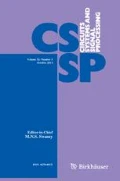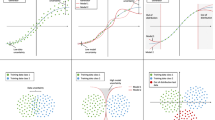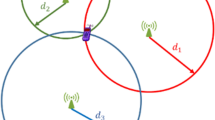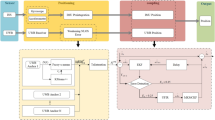Abstract
Wireless sensor communications are distributed, self-disciplined, and on-demand, integrating the benefits of different infrastructure and communication technologies. Recent development in wireless user application requires on-demand localization and target tracking competence to improve communication reliability. This manuscript proposes a learning-based localization (LL) method for minimizing localization errors due to variations in received signal strength assessment. The learning process analyzes the signal in terms of the communication modes adopted by the sensors to identify localization error. Errors in transmission, channel noise, and angle of deviation are addressed using the Gaussian transform (GT) function for the received signal. The errors are recurrently identified with the displacement of the sensor to improve location precision. Distinct from the conventional learning process, this learning is assisted with constraints obtained from a hidden layer to improve the rate of region coverage. The performance of the proposed localization method was evaluated through simulations and was found to improve localization coverage with decreased detection time, energy, and localization error. The experimental results proved the consistency of the proposed LL-GT method by minimizing localization error by 39.47%, energy requirement by 13.73%, and detection time by 26.08% and by improving the coverage by 15.15%.












Similar content being viewed by others
References
S. Afzal, H. Beigy, A localization algorithm for large scale mobile wireless sensor networks: a learning approach. J. Supercomput. 69(1), 98–120 (2014)
M. Ahmed, X. Kong, L. Liu, F. Xia, S. Abolfazli, Z. Sanaei, A. Tolba, BoDMaS: bio-inspired selfishness detection and mitigation in data management for ad hoc social networks. Adhoc Netw. 55, 119–131 (2017)
A. Alarifi, A. Tolba, Z. Al-Makhadmeh, W. Said, A big data approach to sentiment analysis using greedy feature selection with cat swarm optimization-based long short-term memory neural networks. J. Supercomput. (2018). https://doi.org/10.1007/s11227-018-2398-2
O. AlFarraj, A. AlZubi, A. Tolba, Trust-based neighbor selection using activation function for secure routing in wireless sensor networks. J. Ambient Intell. Humaniz. Comput. (2018). https://doi.org/10.1007/s12652-018-0885-1
Y.-J. Chang, C.-H. Ou, K.-F. Ssu, A cluster analysis-based localization scheme for wireless sensor networks using mobile anchor nodes with directional antennas. in 2018 IEEE International Conference on Applied System Invention (ICASI) (2018)
H. Chen, G. Tan, Adaptive iteration localization algorithm based on RSSI in wireless sensor networks. in Cluster Computing (2018)
S. Gezici, A survey on wireless position estimation. Wirel. Pers. Commun. 44(3), 263–282 (2007)
X. Guo, L. Chu, N. Ansari, Joint localization of multiple sources from incomplete noisy Euclidean distance matrix in wireless networks. Comput. Commun. 122, 20–29 (2018)
C.-Y. Han, M. Kieffer, A. Lambert, Guaranteed confidence region characterization for source localization using RSS measurements. Sig. Process. 152, 104–117 (2018)
G. Han, H. Xu, T.Q. Duong, J. Jiang, T. Hara, Localization algorithms of wireless sensor networks: a survey. Telecommun. Syst. 52(4), 2419–2436 (2013)
N. Iliev, I. Paprotny, Review and comparison of spatial localization methods for low-power wireless sensor networks. IEEE Sens. J. 15(10), 5971–5987 (2015)
A. Keshavarz-Mohammadiyan, H. Khaloozadeh, Consensus-based distributed unscented target tracking in wireless sensor networks with state-dependent noise. Sig. Process. 144, 283–295 (2018)
S. Li, Y. Lou, B. Liu, Bluetooth aided mobile phone localization: a nonlinear neural circuit approach. ACM Trans. Embed. Comput. Syst. 13(4), 1–15 (2014)
X. Li, Z.D. Deng, L.T. Rauchenstein, T.J. Carlson, Contributed review: source-localization algorithms and applications using time of arrival and time difference of arrival measurements. Rev. Sci. Instrum. 87(4), 041502 (2016)
F.P.-C. Lin, F.K.H. Phoa, An efficient construction of confidence regions via swarm intelligence and its application in target localization. IEEE Access 6, 8610–8618 (2018)
H. Liu, X. Bai, Z. Yang, A. Tolba, F. Xia, Trust-aware recommendation for improving aggregate diversity. New Rev. Hypermed Multimed. 21(3-4), 242–258 (2015)
L. Liu, G. Han, J. Shen, W. Zhang, Y. Liu, Diffusion distance-based predictive tracking for continuous objects in industrial wireless sensor networks. in Mobile Networks and Applications (2018)
M.W. Morency, S.A. Vorobyov, G. Leus, Joint detection and localization of an unknown number of sources using the algebraic structure of the noise subspace. IEEE Trans. Signal Process. 66(17), 4685–4700 (2018)
S. Phoemphon, C. So-In, T.G. Nguyen, An enhanced wireless sensor network localization scheme for radio irregularity models using hybrid fuzzy deep extreme learning machines. Wirel. Netw. 24(3), 799–819 (2016)
P. Qian, Y. Guo, N. Li, D. Fang, Compressive sensing based multiple source localization in the presence of sensor position uncertainty and nonuniform noise. IEEE Access 6, 36571–36583 (2018)
A.Rahim, K. Ma, W. Zhao, A. Tolba, Z. Al-Makhadmeh, F. Xia, Cooperative data forwarding based on crowdsourcing in vehicular social networks. Pervas. Mob. Comput. (2018). https://doi.org/10.1016/j.pmcj.2018.09.006
C. So-In, W. Katekaew, Hybrid fuzzy centroid with MDV-hop BAT localization algorithms in wireless sensor networks. Int. J. Distrib. Sens. Netw. 2015, 1–18 (2015)
A. Tolba, E. Elashkar, Soft computing approaches based bookmark selection and clustering techniques for social tagging systems. Cluster Comput. (2018). https://doi.org/10.1007/s10586-018-2014-5
T. Wang, Y. Shen, S. Mazuelas, H. Shin, M.Z. Win, On OFDM ranging accuracy in multipath channels. IEEE Syst. J. 8(1), 104–114 (2014)
Y. Wang, J. Hang, C. Li, J. You, S. Chen, L. Cheng, A mobile localization method for wireless sensor network in mixed los/nlos environments, in 2018 8th International Conference on Electronics Information and Emergency Communication (ICEIEC) (2018)
F. Xia, H.B. Liaqat, A.M. Ahmed, L. Liu, J. Ma, R. Huang, A. Tolba, User popularity-based packet scheduling for congestion control in ad-hoc social networks. J. Comput. Syst. Sci. 82, 93–112 (2016)
J. Yan, L. Zhao, J. Tang, Y. Chen, R. Chen, L. Chen, Hybrid kernel based machine learning using received signal strength measurements for indoor localization. IEEE Trans. Veh. Technol. 67(3), 2824–2829 (2018)
X. Zhang, W. Xiong, B. Xu, A computationally efficient received signal strength based localization algorithm in closed-form for wireless sensor network. Neural Process. Lett. 46(3), 1043–1057 (2017)
Acknowledgements
The authors extend their appreciation to the Deanship of Scientific Research at King Saud University for funding this work through research group No. RG-1438-027.
Author information
Authors and Affiliations
Corresponding author
Additional information
Publisher’s Note
Springer Nature remains neutral with regard to jurisdictional claims in published maps and institutional affiliations.
Rights and permissions
About this article
Cite this article
Tolba, A., Al-Makhadmeh, Z. A Recurrent Learning Method Based on Received Signal Strength Analysis for Improving Wireless Sensor Localization. Circuits Syst Signal Process 39, 1019–1037 (2020). https://doi.org/10.1007/s00034-019-01066-5
Received:
Revised:
Accepted:
Published:
Issue Date:
DOI: https://doi.org/10.1007/s00034-019-01066-5




